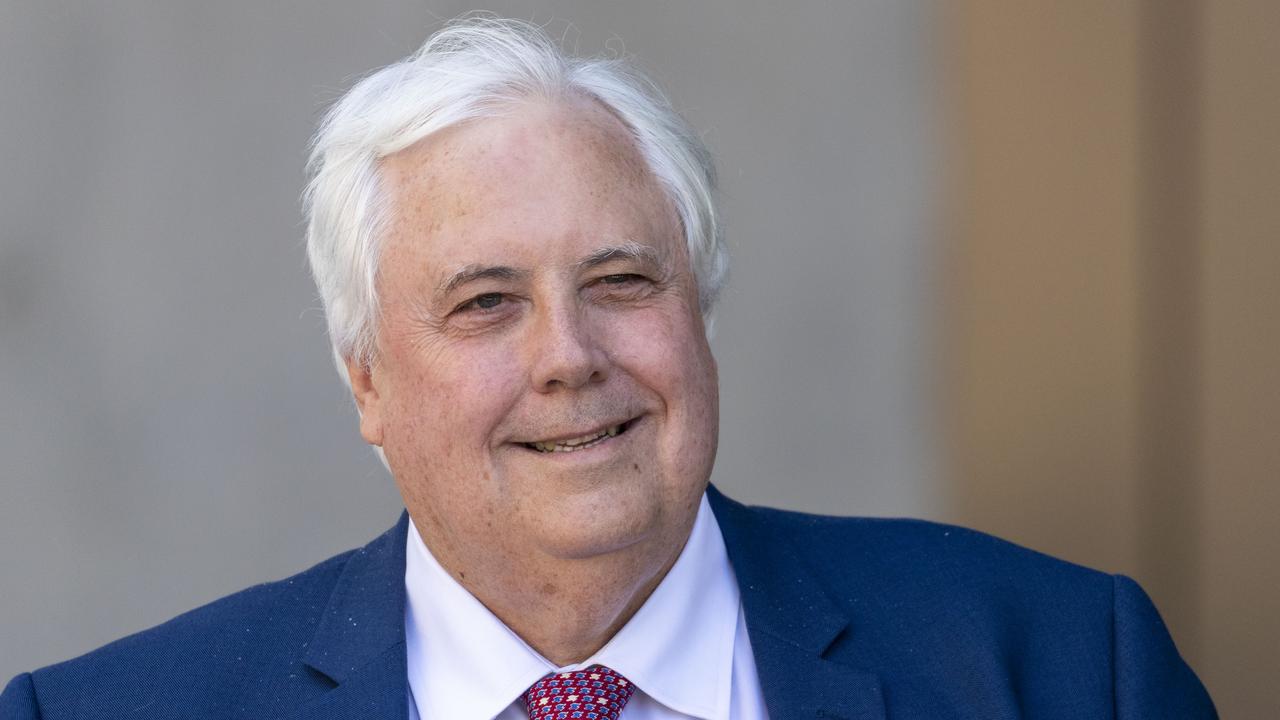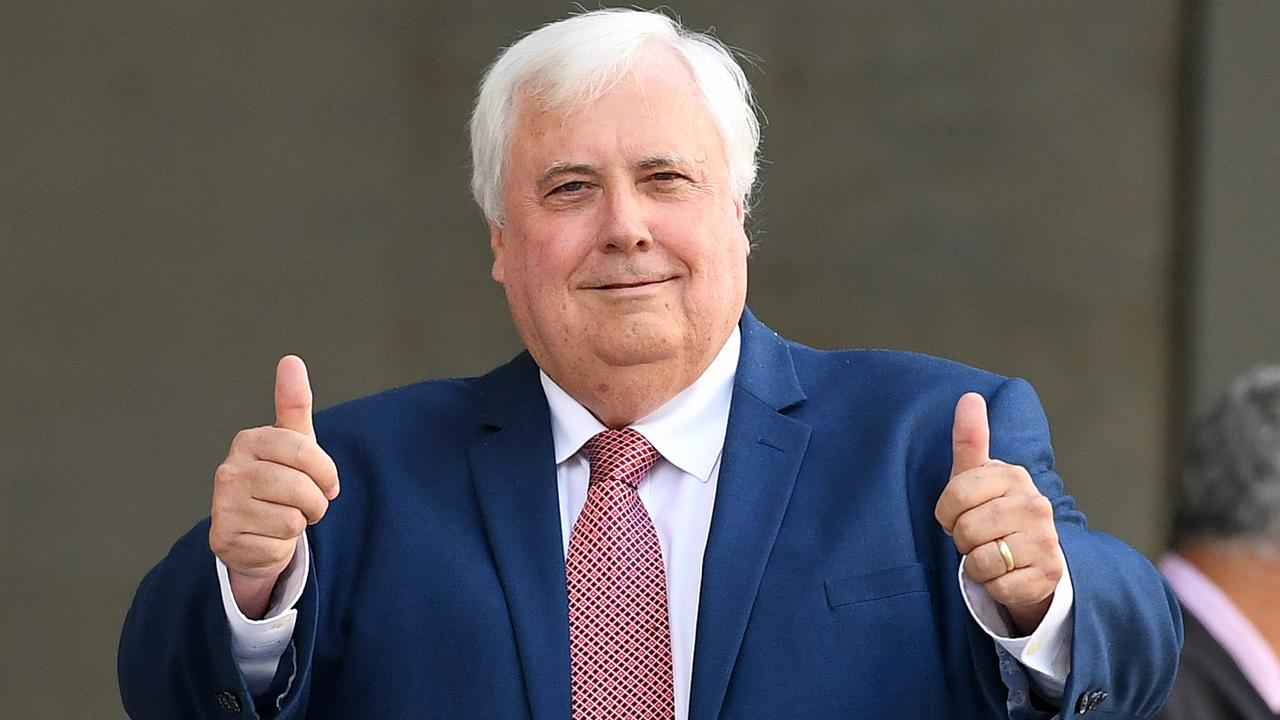Clive Palmer firm Mineralogy’s ‘poor’ indigenous relations
CLIVE Palmer’s flagship company Mineralogy has a “particularly poor” record of working with Aborigines.

CLIVE Palmer’s flagship company Mineralogy has a “particularly poor” record of working with Aborigines, who say their rights and culture have been trampled in his pursuit of mineral wealth on sacred sites.
Mr Palmer’s new political merger with three indigenous Northern Territory politicians comes amid his expressions of grave concern about the health and poverty of Aborigines.
But an examination by The Australian of findings by magistrates in mining court and native title cases show his main company has failed to act in good faith, flouted rules, operated combatively, had little regard for indigenous landowners and may even have destroyed ancient burial sites.
A key witness and senior member of the native title claim group whose evidence was accepted by the mining court, Mathew Sampi, said yesterday he had no confidence in Mr Palmer as the tycoon had broken past pledges to spend money on indigenous health.
“We don’t believe anything he says now,’’ said Mr Sampi, who represents the Kuruma Marthudunera people and grew up fishing and hunting in the Cape Preston area in the Pilbara, near an iron ore project built by Chinese company CITIC Pacific.
“He can suck a lot of Aboriginal people in and some of them really don’t know what they have been talked into. He seemed real good in the beginning, saying he was going to help the Aboriginal people in the area. They destroyed a lot of things, they disturbed special places where there used to be ancient tools.”
Findings by magistrates include that Mr Palmer’s company and staff exhibited “a sense of absolute entitlement in relation to mining endeavours” and “adopted an unduly confrontational approach” with indigenous owners. One of Mr Palmer’s top executives was found to have been an unreliable witness and the architect of “misleading” sworn documents.
Trumpeting the defection of the three indigenous MPs to his Palmer United Party this week, Mr Palmer appealed to indigenous voters to trust his commitment to reduce child deaths above other parties.
“We think it’s unacceptable that indigenous children are dying at twice the rate of white children, and we don’t think because they’re black or white shouldn’t matter when it comes to the death of children,” he said. “All Australians, white or black, are upset to see their children dying at such a rate, and we think something’s got to be done about it. We think the federal government needs to take urgent action to stop that from happening.”
But the acrimonious dealings involving Mr Palmer’s company and Aborigines in remote parts of Western Australia are laid bare in the court findings.
Mr Sampi said yesterday that Mr Palmer told Aboriginal leaders he would establish health services in townships outside the big regional centre of Karratha, particularly in Roebourne where most of the town’s 1000 residents are indigenous. “He’s promised big, lots of money down here for medical reasons and medical stuff, and he’s given nobody nothing.,” he said. “I (first) met Palmer when I was a kid on property he is now leasing. We’ve had a lot of trouble with him. We got suspicious when he stopped talking about it anymore. And then he went back to his place over there in Queensland ...”
Mr Sampi, in Perth with his family yesterday for chemotherapy, said it was important to stand up for his land and he believed there were lessons for other Aborigines in his experience. According to one of the findings in 2012, Mineralogy’s approach and past conduct “gives rise to serious and genuine concerns about heritage protection” or legal compliance.
In an earlier Native Title Tribunal case, Mineralogy was found to have given a “take it or leave it” ultimatum to indigenous owners of the land the company wanted to mine. Tribunal deputy president John Sosso found that Mineralogy had not acted prudently, reasonably or responsibly in its dealings with Aborigines. In a case involving the Kuruma Marthudundera group, elders Neil Ricky Finlay and Mr Sampi told the court of bad experiences with the company in the Pilbara region, which includes sacred burial grounds near the Cane River and the town of Karratha.
The Mining Court’s magistrate, Elaine Campione, described the two elders as “respected, senior and knowledgeable men” and she accepted their evidence.
“In relation to (Mineralogy), Mr Finlay doubts their genuineness as they have not engaged in bona fide negotiations with the KM people,” Ms Campione found. “He complains that (Mineralogy) have never treated the KM people with respect and have never undertaken proper surveys … he says that the KM people are worried about what (Mineralogy) has done in the past and is worried about what they might do on their country and the damage that they may cause to their heritage.”
Ms Campione’s judgment stated: “Like Mr Finlay, Mr Sampi does not trust (Mineralogy) and is very concerned as to what would happen if (the company) was permitted to mine in the area. He tells the court that (Mineralogy) and the KM people have had many arguments over the years. He states that (Mineralogy) has never done proper heritage surveys with them and does not know where the (sacred and burial) sites are.
“He has complained to the Department of Indigenous Affairs about (Mineralogy) as he believes that they have damaged or destroyed the sites and concludes that they lack respect.”
The land included sacred waterways, permanent waterholes, burial grounds, reliable bush tucker and hunting areas, and was of important historical and cultural value.
Ms Campione said none of the evidence presented by Mr Finlay and Mr Sampi “was contested by (Mineralogy)”. She said she shared the view of Mr Sampi and Mr Finlay that Mineralogy had a “particularly poor approach to cultural and heritage matters, including a complete lack of consultation”.
Mr Palmer’s executives told the court the elders had no right to object to Mineralogy’s mining plans. But Ms Campione rejected Mineralogy’s arguments, describing one as “fallacious”.
Mr Palmer did not answer The Australian’s questions, texting: “Ask them not me.”



To join the conversation, please log in. Don't have an account? Register
Join the conversation, you are commenting as Logout